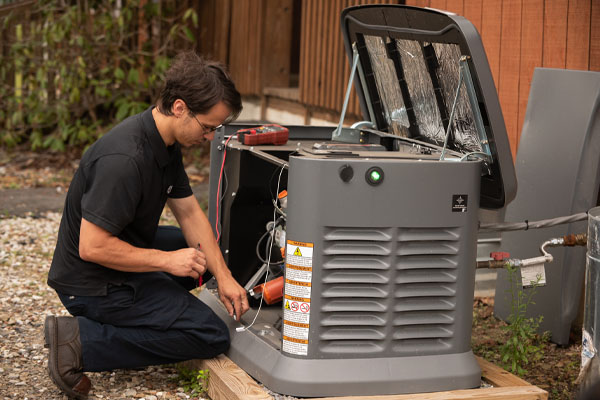How Does A Generator Work?

The progress we have made for access to reliable power has come a long way. However, this doesn’t mean that power grids are perfect. Power failures can still happen for one reason or another. Severe weather, accidents, damage from construction work, and more factors can cause a blackout, leaving homes without power for days. As a result, many homes, offices, and other buildings rely on on-demand generators for power during an outage. This machine also supplies power to places that aren’t within the grid’s supply radius.
Since R.F. Ohl specializes in whole-house generators, we are constantly asked “How does a generator work?”. Read on to find the answer to this inquiry.
How Does A Generator Work?
Contents
Generators are typically called on-demand, standby, whole-house, or backup generators. They work by converting mechanical energy to electrical energy. The electricity is then transferred and distributed all over a building. A generator can also supply power to cars, trains, ships, and aircraft. Many areas also utilize generators as an alternative source of energy.
The principle of electromagnetic induction is utilized in a generator’s operation. The generator has a copper conductor coil inside it. This coil and its metal core are referred to as the armature. This rotates in the middle of a horseshoe-shaped magnet. It is also connected to a mechanical energy source, like a motor. The rotation of the armature generates the energy needed to power the generator. The generator’s engine uses fuel to work, such as natural energy, natural gas, petrol, or diesel.
The coil rotation will obstruct the magnetic field in the two magnetic poles within the horseshoe-shaped magnet. This magnetic field interference will agitate the electrons within the conductor. As a result, it induces an electric current to flow.
The alternator, also called a generator unit, produces the alternating current (AC). It is the type of current that the power grid provides. AC is a stable and reliable power type. It can even provide power to sensitive appliances like surgical equipment, air conditioning units, and computers without fluctuating.
Generator engines come in various sizes. The type of generator that has the largest engine is a liquid-cooled generator. They are equipped with a pump that distributes the coolant through the unit as a fan blows air to lower its temperature. This type of generator is ideal for areas with a hot and humid climate because it helps keep the unit from overheating.
How Much Power Can A Backup Generator Produce?
The generator’s power capacity relies on its engine size. A larger engine means the generator produces more energy for more rooms and structures. The unit’s output is usually in Watts (W) or kiloWatts (kW). The Watts calculation is Volts x Amps.
This is exemplified like so: a 10kW generator with 240 Volts has 41.67 or 42 amps of estimated output. This means that there is sufficient energy to power one 1200 W refrigerator, about ten lighting circuits that total 1000 W, one 1000 W sump pump, one 1000 microwave oven, and one 500 W furnace fan. It is also enough to supply power to a desktop computer, a laptop, and other smaller appliances, depending on the input needed. Therefore, when investing in a standby generator for your home, it is crucial to find the right generator size to meet your needs.
Benefits Of Using An On-Demand Generator

The standby generator’s main advantage is providing access to a power source during an emergency. Power outages can happen at any time, making generators more crucial, especially if you live in an area that tends to have unreliable electricity sources. Access to a generator is vital for services and businesses dependent on electricity to operate, including hospitals, clinics, pharmacies, and factories.
Emergencies like natural disasters mean that standby generators are necessities as they are needed by care personnel and medical equipment. Aside from lighting, generators also power machines and equipment needed to conduct rescues, surgeries, and other important services.
Damage and waste prevention is another key benefit generators provide. Generators are equipped with a feature that turns it on as soon as the power goes out. Therefore, all appliances and equipment run continuously, ensuring that your day goes smoothly and without interruptions. Food, medications, and other products are also continuously produced because there is electricity for the appliances. Power from a generator also helps keep damage from spoilage and the growth of microorganisms. If you work from home, you will also have continued access to your computer, so there will be no time lost from work. You can also make sure there is continuous comfort throughout your home because you can use your HVAC system.
Features Of A Whole-House Generator
Some of the whole-house generator features are listed below:
- Power: Generators come in various power output capacities. This allows them to supply electricity to structures that range from small offices or homes to larger ones like factories and offices. As generators are available in different power capacities, end-users can match their needs to their chosen generator models.
- Fuel: Fuels that can power a generator include natural gas, petrol, diesel, and LPG, among others. Having alternative sources of energy lets a wide range of consumers utilize a generator for their electricity needs.
- Noise: Older models are known to produce loud noises. However, newer generators have noise-reducing technology, so you can use them close to a structure or next to schools, hospitals, offices, and other buildings.
Conclusion
Aside from bringing convenience and comfort, generators are also lifesavers. They are stable, flexible, and highly reliable when there are power outages. Generators are safe to use and easy to operate because they have an improved design and extra features. Highly dependable brands last for a long time, so you can be sure that they can be relied upon for power for many years.
Remember that several things need to be factored in before purchasing a generator. This way, you can be sure that you have the most fitting capacity and type for your home’s power needs. Consider talking about your needs with an expert if you are unsure. This will help you make an informed decision regarding choosing the best generator for your home.
Call R.F. Ohl For Your Standby Generator Needs

R.F. Ohl provides excellent whole-house generator services throughout the Poconos and the Lehigh Valley, Pennsylvania. We have a team composed of professionally certified and highly skilled technicians for all your high-quality standby generator service needs, such as backup generator maintenance, repairs, and installations. Each of our trained techs conducts prompt and accurate whole-house generator services at all times.
Rest assured, our company offers highly competitive on-demand generator service rates. Working with us means you can expect a friendly crew, reliable services, and transparent prices. All our work comes with a guarantee. To schedule a service appointment, call R.F. Ohl today. We offer free, in-home estimates.
Click here to contact us today or give us a call at (610) 377-1098 if you have any questions.